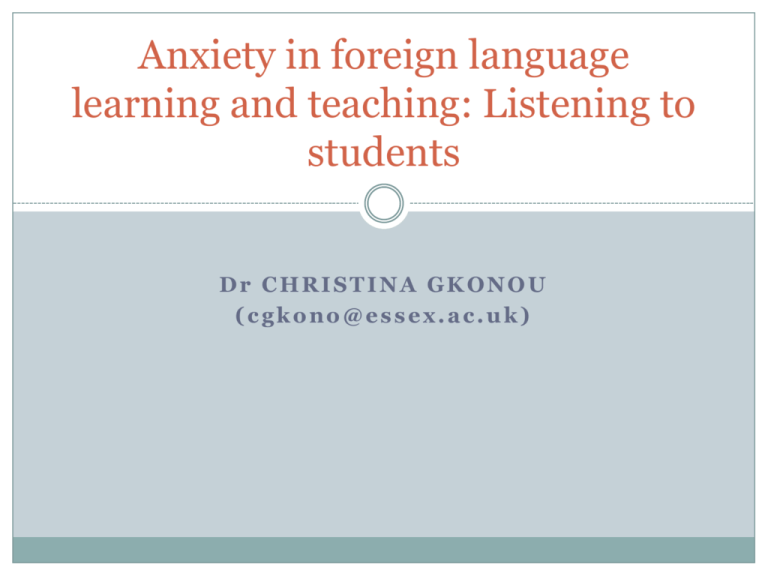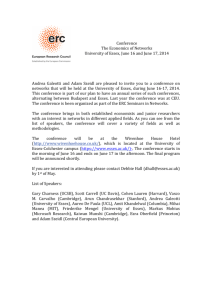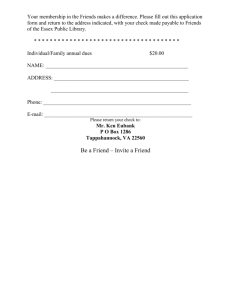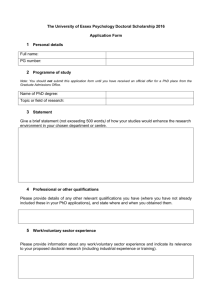
Anxiety in foreign language
learning and teaching: Listening to
students
Dr CHRISTINA GKONOU
(cgkono@essex.ac.uk)
Workshop outline
2
Your own ideas.
Theoretical background.
My research.
Implications for foreign language teaching/teacher
education.
Essex Language Conference for Teachers 2015
Sharing experiences...
3
With your partner, discuss the following questions:
Have you ever had any highly anxious students in your class?
Can we see anxiety in students?
Have you (as teachers) ever experienced anxiety when
teaching? If yes, when?
Think of your own experience/s of learning a foreign language.
Is/Was there anything that would make you anxious?
Essex Language Conference for Teachers 2015
4
Essex Language Conference for Teachers 2015
Language anxiety
5
“a distinct complex of self-perceptions, beliefs,
feelings, and behaviours related to classroom
language learning arising from the uniqueness of the
language learning process” (Horwitz, Horwitz, &
Cope, 1986, p. 128).
Communication apprehension, fear of negative
evaluation, test anxiety.
Essex Language Conference for Teachers 2015
Language anxiety (cont.)
6
Situation-specific.
“initially, anxiety is an undifferentiated, negative
affective response to some experience in language
class”, but...
...“with repeated occurrences, anxiety becomes
reliably associated with the language class and
differentiated from other contexts”.
(MacIntyre & Gardner, 1991, p. 297)
Essex Language Conference for Teachers 2015
Language anxiety (cont.)
7
Largely debilitating: “language anxiety interferes
with acquisition, retention, and production of the TL
[target language]” (Gregersen & MacIntyre, 2014, p.
4).
At times closely associated with the learner, and...
...at others with the teacher!
Essex Language Conference for Teachers 2015
My research project
8
Participants:
128 adult Greek EFL learners.
2 private language schools in Thessaloniki, Greece.
44 male, 84 female students.
Four proficiency levels: B1, B2, C1, C2 (CEFR, 2001).
86 studying at HEI in Thessaloniki, 42 working.
Highly anxious: score range: 93-147 (min=33,
max=165).
Essex Language Conference for Teachers 2015
Students said...
9
While speaking, my interlocutor is waiting for my
reply. If I had time to think about my answer, that
would be fine. But this is impossible. Time flies and I
need to say something. I am like this when I am
driving. I am thinking that if someone comes and
stops right behind me, I am bothering him/her and I
have to go. I have to be quick.
Essex Language Conference for Teachers 2015
Students said...
10
I feel that if I make a mistake in speaking my
teacher knows that in an attempt to express what I
have in mind I got confused and chose the wrong
preposition or the wrong word. On the contrary, in
writing, I very often fear that when my teacher will
read what I wrote, she will think like “Why did she
make so many mistakes? She had time at her
disposal, she could use a dictionary or her notes, and
still she made mistakes”.
Essex Language Conference for Teachers 2015
Students said...
11
K: I really fear making mistakes, not because I’ve made a mistake and that
means that I haven’t studied enough, but rather because I tremble from
my teacher’s and my peers’ reaction to it. I know that my teacher calls
on us in a predictable order and I know when it is my turn to speak. So
I read my question again and again to make sure that I can give as
accurate an answer as possible, but I ignore everything else that goes on
in the classroom at that time.
C: From your experience, what could your teacher’s reaction be like?
K: I don’t know. I think that my teacher will have a condescending
attitude and will tell me that I am not well prepared. And that my
classmates will laugh at my mistake.
C: Does this happen in the end?
K: Well, I think that in a class there will possibly be one or two students
that you don’t like or they don’t like you. That’s why I am expecting
them to laugh at my mistake. As for the teacher, I think I want to show
him that I am doing my best. But now that I come to think about it,
maybe it’s just a situation I’ve created in my mind. It may be something
like a phobia.
Essex Language Conference for Teachers 2015
Students said...
12
I see my teacher as my boss. When I know I am
seeing someone who is superior to me and I know
that I will be judged by the way I’ll answer his/her
questions, I get nervous. I am not self-confident
and I feel that my level of English is low.
Essex Language Conference for Teachers 2015
Students said...
13
When I haven’t studied, I am no nervous at all. I get
extremely anxious when I am well prepared. Because
you’ve expended some effort, and you don’t want to
fail. If you don’t do well despite having studied, you
feel even worse.
Essex Language Conference for Teachers 2015
Students said...
14
Classmates can make me anxious in two different ways.
First, they are anxious too, they are getting hysterical,
and they make me anxious, and this is something very
common. I mean you are on your way to the lesson and
you are relaxed, but as soon as you enter the school you
realise how anxious they are, so you become anxious too.
Second, they can be a bit of a snob and you know that
they are stronger students than you actually are. So, you
try to be like them, but by the time you realise that that’s
not possible, your feelings of anxiety overwhelm you.
Essex Language Conference for Teachers 2015
Sharing experiences again...
15
How can we deal with language anxiety? What
strategies can we use?
Essex Language Conference for Teachers 2015
Implications for teaching
16
The role of the teacher:
open-minded
and understanding;
motivating and interested;
willing to work with students.
Student-teacher interaction:
appreciate
students’ contributions;
correction methods particularly important.
Time:
allow
time for students to think, prepare, and
practise language.
Essex Language Conference for Teachers 2015
Implications for teaching (cont.)
17
Activities, themes and materials important:
participation and growing confidence linked to interest in
materials and activities.
Introduce explicit discussion of LA (and other
affective factors): make this part of normal classroom
activities/teacher education programmes.
Classroom organisation:
group work, pair work may need to be explored before
whole class and individual presentations.
Essex Language Conference for Teachers 2015
Suggestions from positive psychology
18
A situation-analysis technique involves:
(a) thinking about a time/event when positive emotion, such
as pride, gratitude, pleasure, satisfaction, interest, or hope,
were felt;
(b) recalling situational details;
(c) giving the situation a name; and
(d) specifying the emotion(s).
With this information, learners can be aided in “setting
up moments of genuine positivity” for themselves
(Seligman, 2011, p. 141).
Essex Language Conference for Teachers 2015
Suggestions from positive psychology (cont.)
19
Positive self-talk:
“I love _______ about this language,” “My favorite part
of the language is _____,” and “I will stop worrying
about the outcome and instead focus on _______”
(Oxford, 1990, 2011);
Essex Language Conference for Teachers 2015
Suggestions from positive psychology (cont.)
20
Becoming proficient in a foreign language requires
that learners take responsibility for their own
learning.
Useful to teach learners how to generate
alternative pathways towards a particular goal
(pathways thinking) (Oxford, 1990, 2011).
Setting realistic/plausible/achievable goals.
Essex Language Conference for Teachers 2015
Empowering students...
21
Essex Language Conference for Teachers 2015
References
22
Gregersen, T., & MacIntyre, P. D. (2014). Capitalizing
on language learner individuality: From premise to
practice. Bristol, UK: Multilingual Matters.
Horwitz, E. K., Horwitz, M. B., & Cope, J. (1986).
Foreign language classroom anxiety. The Modern
Language Journal, 70(2), 125-132.
MacIntyre, P.D., & Gardner, R.C. (1991). Language
anxiety: Its relation to other anxieties and to
processing in native and second languages.
Language Learning, 41(4), 513-554.
Essex Language Conference for Teachers 2015
References (cont.)
23
Oxford, R. L. (1990). Language learning strategies:
What every teacher should know. Boston: Heinle.
Oxford, R. L. (2011). Teaching and researching
language learning strategies. Harlow, UK: Pearson
Longman.
Seligman, M. E. P. (2011). Flourish: A visionary new
understanding of happiness and well-being. New
York: Free Press.
Essex Language Conference for Teachers 2015
Coming out soon...
24
Gkonou, C., Daubney, M., & Dewaele, J.-M.
(forthcoming). New insights into language
anxiety: Theory, research and educational
implications. Bristol: Multilingual Matters.
Essex Language Conference for Teachers 2015
25
THANK YOU FOR YOUR
ATTENTION AND
PARTICIPATION!
Essex Language Conference for Teachers 2015





